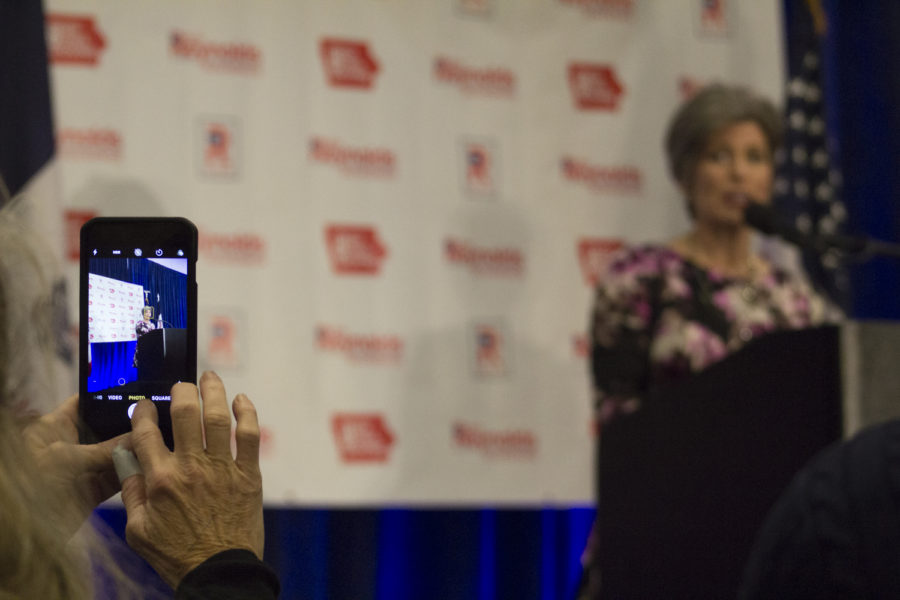The US Senate race is the first-ever female versus female race in Iowa
October 15, 2020
The Iowa U.S. Senate race is making history in this general election.
The U.S. Senate race is between incumbent Joni Ernst (R) and Theresa Greenfield (D), making it Iowa’s first-ever female versus female U.S. Senate race. The race neutralizes gender bias and may help more women want to seek political office, political observers said. The campaign ads in the race are also more attack based.
In November, Iowa will elect a female senator, making her the second Iowa female U.S. senator. Ernst became first-ever elected female senator from Iowa in 2014.
“We know Iowa is going to elect a woman to the U.S. Senate, the question is whether or not they are a Democrat or Republican,” said Karen Kedrowski, director of the Carrie Chapman Catt Center for Women and Politics.
There have been 57 women elected to the U.S. Senate. There have been 12 U.S. Senate races that have been a Democrat woman versus a Republican woman, according to the Center for American Women and Politics.
“It is relatively rare to have two women competing against each other for a Senate seat,” said Kelly Winfrey, assistant professor in journalism.
Gender becomes less of an issue when both candidates are the same gender, Winfrey said.
“There is a lot of research that shows that voters associate certain traits or issues with women candidates and with men candidates,” Winfrey said. “When you have two women running against each other, it makes gender less of an issue in terms of the effect it has on voters’ gender biases.”
Without having a gender difference, voters focus more on issues and policies candidates are representing.
“Women have to demonstrate both that they have the stereotypical masculine leadership traits as well as filling our gender expectation about how women are supposed to behave,” Winfrey said.
The advertisements from both Greenfield and Ernst talk about their families and taking care of people, along with talking about their accomplishments and their leadership positions.
“Those types of advertisements balance the masculine and feminine traits,” Winfrey said.
Many advertisements have been airing on YouTube, Hulu and television. The advertisements have been attacking candidates on personal and issue bases.
Both candidates and organizations have been issuing a lot of attack ads, Kedrowski said.
“I’ve noticed a lot of aggressive campaign ads,” said Abigail Meehan, Iowa State College Democrats communications director and junior in political science.
Kedrowski said the advertisements have had a sexist overtone on the attacks.
“An advertisement against Theresa Greenfield has been that she personally shut down small businesses,” Kedrowski said. “That kind of attack, in particular, has kind of a sexist overtone when women are supposed to be nurturing and helpful.”
Ernst has received attack advertisements as well as Greenfield.
“Ernst is being portrayed as a ‘Trump twin,’ which draws parallels between a particular unpopular politician among women and Democratic voters,” Kedrowski said.
The attack ads are not only from candidates but also outside political organizations, Kedrowski said.
Many organizations such as NextGen, Progress Now, People for the American Way and other organizations have created advertisements attacking candidates.
Having women in high political positions may help allow more women to pursue political office.
“Role models matter, when people see someone who looks like them or shares some of their background characteristics that really does encourage other women to think running for public office is an attainable goal,” Kedrowski said.
In Iowa, there are currently seven women running for federal office this election.
“Researchers found that women are more engaged and interested in politics when they see women running successfully, especially for high-level offices,” Winfrey said.
On Nov. 3, Iowa will elect a woman to the U.S. senator for the second time in Iowa’s history.
“Regardless of who wins, having a woman in Congress is good,” Meehan said.

















